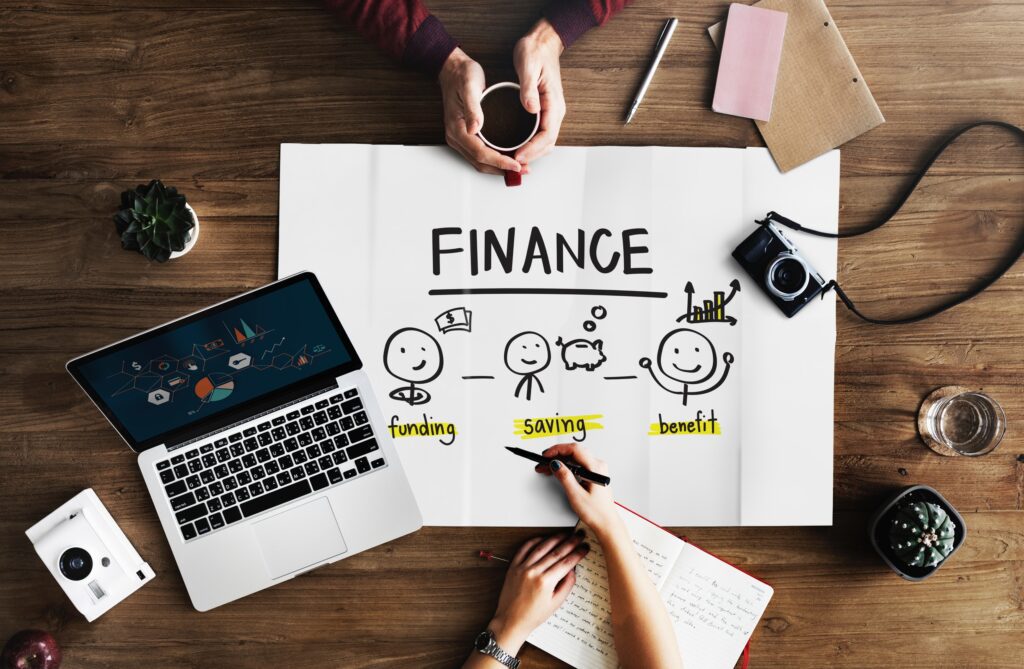The autumn report of the leading German economic institutes has arrived and at first glance it looks rather less rosy. The researchers predict a recession for the coming year.
A recession describes a period of decline in economic activity. What does that mean for you and your financial situation? Do you have to worry about your wealth? How can you still invest your money in a recession? To better understand it, you need a long-term and holistic view of the economic situation. We want to explain to you the “big picture” before you act.
What happens if we go into recession?
Let’s start from the beginning. Our economy runs in a business cycle with four phases: expansion, peak (boom), contraction or recession (real GDP is decreasing), and trough (depression).
You can recognise a recession by various signs. If the gross domestic product (GDP) shrinks for at least two quarters in a row, it’s called a technical recession. During a recession, the entire economy struggles, for example people lose work, companies make fewer sales and the overall economic output declines.
Many prefer to save rather than buy. Supply bottlenecks and skyrocketing energy prices make products more expensive. This is the main reason for high inflation (7.9% in August 2022). To counter inflation, it would be economically advisable to spend money before it is worth less.
However, many consumers prefer to hold back because they fear the high energy costs. For many, private security comes first. Of course, this is understandable. But do we really only want to look at the next two years, until the economic downturn is over? It is important to understand that the economy runs in a cycle.
After the expansion comes the recession
Admittedly, this all sounds a bit end of the world, and yes – some of us should rethink our lifestyle. Do you really need to take an expensive holiday this year? Is it really necessary to renew your entire wardrobe for the next season?
Of course, there are households that have far more existential problems than foregoing various leisure pleasures. Some have to think about how they are going to pay next month’s rent. No question, there were better times and we should all tighten our belts.
But there is good news. After the recession, historically speaking, expansion always comes. This is predicted for 2024. Inflation is then expected to fall again to around 2%. Private security means not only surviving in the here and now, but also providing for the future self in the long term. What does the 2023 recession mean for you and your portfolio?
It is important that you try to stay calm and not panic. True, we should reduce some unnecessary expenses in the next 1-2 years, cut back here and there.
But keep in mind that this is a very short time compared to your retirement. It is necessary that you think in the long term. When investing in your retirement savings, the sooner the better. It can make a world of difference if you start.
How to start investing in a recession?
There are two important mantras you should follow when it comes to investing and the crisis: If you are already investing – keep your hands off your portfolio. Don’t sell in a hurry because you are afraid of e.g. rising energy and food costs. The money you invest only becomes real when you sell your investments. If you leave it, nothing happens and it has a chance to grow until you really need it.
OWN YOUR FINANCES!
Finally want to get a handle on your finances? Know where to start to be financially independent? Get your support now and arrange a FREE ESPRESSO COACHING! Your financial freedom with our experts!
If you haven’t invested yet, but have been toying with the idea, there’s no reason to back out. Direct investments in shares or cryptocurrencies are not recommended when starting a financial investment, especially in the current crisis. Here, the necessary diversification is lacking and you are “gambling” with your money because, figuratively speaking, you are putting all your eggs in one basket.
Why should you invest even in times of crisis?
Keep in mind that investments are usually longer-term goals than this recession will last. But the crux of the matter is when to start investing. If you don’t start investing until two years from now, after the predicted upswing, you can lose a lot of money, e.g. for your pension.
You want to start investing now? Then it is advisable to invest more in equities during a recession via an equity-based exchange trade fund (ETF). Why? You can buy shares cheaply at the moment and then wait for their value to rise – which it often does once the downturn is over.
Investing in an ETF has several advantages over investing in individual stocks. You can invest in a more diversified way because you don’t have to focus exclusively on stocks as a component of the mutual fund. If you want to do that, no problem. Your ETF is flexible and you can change the allocation of the securities it contains at any time.
This means, for example, that you can adjust it if a different phase of the economic cycle is coming up and you want to invest more in other securities. Unfortunately, not all stocks recover from their record lows after the recession. By diversifying, investing in many different companies and countries through stocks or even bonds, your investment is less volatile. So we think an ETF is a good place to start.
To sum up, there have been better times – we don’t want to deny that. Nevertheless, at some point our economy will get back on its feet. Commerzbank-Chef Knof sees no reason to panic despite the difficult situation. Holger Schmieding also concedes that a recession would not last forever, but would rather become a winter problem.
So, take the situation seriously, try to spend your money consciously, but don’t skimp on your investment when you have your nest egg together. Your retirement savings will thank you.
Quellen
computerbild.de
rnd.de
forbes.com
spiegel.de
zeit.de
br.de





